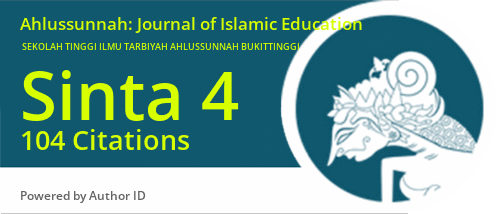Independent Curriculum Practices in the Learning System in Junior High Schools
DOI:
https://doi.org/10.58485/jie.v3i3.284Keywords:
Implementation, independent curriculum, Fiqh lessonsAbstract
The Merdeka Curriculum (Independent Curriculum) is a curriculum implemented by the Indonesian Ministry of Education, Research, and Technology since 2022. Although this curriculum aims to improve the quality of education in Indonesia, several problems have been identified in its implementation. Therefore, this study aims to analyze the implementation of the Merdeka Curriculum in Islamic jurisprudence (Fiqh) at a junior high school. This study used a qualitative case study method. Data were collected through in-depth interviews with ten informants, including the principal, vice principal for curriculum, teachers, and students. All data were analyzed using the thematic interactive model of data analysis of Miles and Huberman. The research findings describe how the Merdeka Curriculum is implemented in Islamic jurisprudence (Fiqh) through three stages: i) planning by teachers, ii) learning implementation, including opening, core, and closing activities, and iii) evaluation of student outcomes. Overall, all stages have been implemented successfully through the concept of independent learning in the practice of the Merdeka Curriculum.
Downloads
References
Adel, S., Athari, Z., Febriani, A., Oktavia, G. ., & Burhanudin, B. (2025). The Qur’an as a Source of Solutions for the Global Moral Crisis. Journal of Quranic Teaching and Learning, 1(2), 18-33. https://joqer.intischolar.id/index.php/joqer/article/view/10
Aminah, S., Ramawani, N., Azura, N., Fronika, S., Hasanah, S. M., & Salsabillah, T. (2022). Pengaruh Metode Belajar Sambil Bermain Terhadap Perkembangan Kognitif Anak Usia Sekolah Dasar. Science and Education Journal (SICEDU), 1(2), 465-471. https://doi.org/10.31004/sicedu.v1i2.66
Aryanti, Y., Mutathahirin, M., Rahman, I., & Mulyani, R. (2022). Teacher Analysis Study According to Imam Al Ghazali in the Book of Al Adab Fi Al-Din. Ahlussunnah: Journal of Islamic Education, 1(2), 46-58. https://doi.org/10.58485/jie.v1i2.177
Astutik, A. P., & Khoirinindyah, S. (2024). Implementasi kurikulum merdeka skema mandiri belajar pada lembaga pendidikan anak usia dini. PERDIKAN (Journal of Community Engagement), 6(2), 94-102. https://doi.org/10.19105/pjce.v6i2.10057
Dasrizal, D., Rambe, K. F., Sihombing, C. D., Khalid, E., & Safitri, D. A. (2025). Distortion of Quranic Interpretation on Socialmedia: An Analysis of the Spread of Misleading Meanings. Journal of Quranic Teaching and Learning, 1(2), 65-82. https://joqer.intischolar.id/index.php/joqer/article/view/8
Efendi, E., Ramadhani, R., Kamil, R. A., & Rahman, I. (2022). The Effect Of Building The Islamic Character Of Students At Wisma Padang State University. Jurnal Kepemimpinan dan Pengurusan Sekolah, 7(3), 271-280. https://doi.org/10.34125/jkps.v7i3
Engkizar, E., Jaafar, A., Alias, M. F. B., Guspita, R., & Albizar, A. (2025). Utilisation of Artificial Intelligence in Quranic Learning: Innovation or Threat?. Journal of Quranic Teaching and Learning, 1(2), 1-17. https://joqer.intischolar.id/index.php/joqer/article/view/7
Engkizar, E., Jaafar, A., Masuwd, M. A., Rahman, I., Datres, D., Taufan, M., Akmal, F., Dasrizal, D., Oktavia, G., Yusrial, Y., & Febriani, A. (2025). Challenges and Steps in Living Quran and Hadith Research: An Introduction. International Journal of Multidisciplinary Research of Higher Education (IJMURHICA), 8(3), 426–435. https://doi.org/10.24036/ijmurhica.v8i3.396
Engkizar, E., Jaafar, A., Sarianto, D., Ayad, N., Rahman, A., Febriani, A., ... & Rahman, I. (2024). Analysis of Quran Education Problems in Majority Muslim Countries. International Journal of Islamic Studies Higher Education, 3(1), 65-80. https://doi.org/10.24036/insight.v3i1.209
Engkizar, E., Jaafar, A., Taufan, M., Rahman, I., Oktavia, G., & Guspita, R. (2023). Quran Teacher: Future Profession or Devotion to the Ummah?. International Journal of Multidisciplinary Research of Higher Education (IJMURHICA), 6(4), 196-210. https://doi.org/10.24036/ijmurhica.v6i4.321
Engkizar, E., Muslim, H., Mulyadi, I., & Putra, Y. A. (2025). Ten Criteria for an Ideal Teacher to Memorize the Quran. Journal of Theory and Research Memorization Quran, 1(1), 26-39. https://joesmiq.intischolar.id/index.php/joesmiq/article/view/54
Ledia, S. L., & Bustam, B. M. R. (2024). Implementasi kurikulum merdeka dalam meningkatkan mutu pendidikan. Reslaj: Religion Education Social Laa Roiba Journal, 6(1), 790-816. https://doi.org/10.47467/reslaj.v6i1.2708
Manurung, P., & Syahril, A. (2023). Strategi komunikasi efektif dalam pembelajaran pendidikan agama Islam Pesantren Darul Arafah. KomunikA, 19(02), 42-47. https://doi.org/10.32734/komunika.v19i02.13789
Marhamah, M., & Zikriati, Z. (2024). Mengenal Kebutuhan Peserta Didik Diera Kurikulum Merdeka. Wathan: Jurnal Ilmu Sosial Dan Humaniora, 1(1), 89-106. https://doi.org/10.71153/wathan.v1i1.32
Putri, N., Noprianti, A., & Oktavia, G. (2025). The Qur'an as a Source of Solutions for the Global Moral Crisis. Journal of Quranic Teaching and Learning, 1(2), 90-105. https://joqer.intischolar.id/index.php/joqer/article/view/10
Rahman, I., Iskandar, M. Y., Kustati, M., & Sepriyanti, N. (2024). Sustainable Development: Implementation of The Talqin Method In Memorizing The Quran. Jurnal Kepemimpinan dan Pengurusan Sekolah, 9(1), 99-108. https://doi.org/10.34125/jkps.v9i1.355
Rahman, I., Kaema, M. T., Nurhapipah, N., Nelwati, S., Sabri, A., & Rahmanda, R. (2024). Systematic Literature Review: Analysis of Project-based Learning Models from Elementary to High School. Al-Ashri: Ilmu-Ilmu Keislaman, 9(2), 53-66. https://ojs.stai-bls.ac.id/index.php/Al-Ashri/article/view/119
Rahman, I., Wati, W., Putri, N., Wulandari, R., & Habibi, U. A. (2025). Commercialization of Quranic Tahfidz Houses in Indonesia: Da’wah or Business?. Journal of Quranic Teaching and Learning, 1(2), 34-48. https://joqer.intischolar.id/index.php/joqer/article/view/6
Rahmat, I., & Ridwan, R. (2020). Implementasi Andragogi Platform E-learning pada Blended Learning di Universitas Negeri Padang. Journal of Education Technology, 4(2), 133-140. https://doi.org/10.23887/jet.v4i2.24817
Rani, P. R. P. N., Asbari, M., Ananta, V. D., & Alim, I. (2023). Kurikulum merdeka: transformasi pembelajaran yang relevan, sederhana, dan fleksibel. Journal of Information Systems and Management (JISMA), 2(6), 78-84. https://doi.org/10.4444/jisma.v2i6.736
Rasdiany, A. N., Akmal, F., Pasaleron, R., Dafrizal, D., Ningsih, R., & Rahman, I. (2024). Systematic Literature Review: The Impact of Social Competence on Teacher Communication Intelligence. Jurnal Kepemimpinan dan Pengurusan Sekolah, 9(2), 239-251. https://doi.org/10.34125/jkps.v9i2
Suhartono, O. (2021). Kebijakan merdeka belajar dalam pelaksanaan pendidikan di masa pandemi covid-19. Ar-Rosikhun: Jurnal Manajemen Pendidikan Islam, 1(1), 8-19.https://doi.org/10.18860/rosikhun.v1i1.13897
Downloads
Published
How to Cite
Issue
Section
License
Copyright (c) 2024 indramahdi, Wirman Hanizon, Afifah Febriani, Rosi Guspita

This work is licensed under a Creative Commons Attribution-ShareAlike 4.0 International License.
Creative Commons Attribution 4.0 (CC BY)











